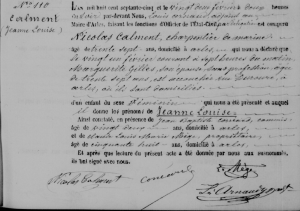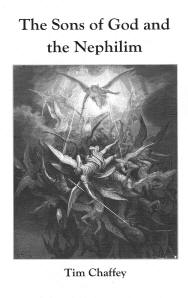
Genesis 6:3 is another example of a commonly misused Bible verse. A closer look at the verse itself and its immediate context clears up the misconceptions.
“It took Noah 120 years to build the Ark.”
I come across this sentiment nearly every day. I have had the tremendous blessing to work on the content for the upcoming Ark Encounter theme park so I frequently hear what people think about the Flood account. Because so many people recite this claim one would think that it comes directly from Scripture, but is that really the case? Does the Bible ever teach that Noah needed this length of time to build the Ark?
Difficult to Translate
The idea of “120 years” is drawn from Genesis 6:3. Before examining what this verse actually means, we need to realize that it is a difficult verse to translate. This fact is borne out by the way it is translated in our English Bibles.
And the LORD said, “My Spirit shall not strive with man forever, for he is indeed flesh; yet his days shall be one hundred and twenty years.” (NKJV)
Then the LORD said, “My Spirit will not contend with humans forever, for they are mortal; their days will be a hundred and twenty years.” (NIV2011)
And the LORD said, “My Spirit will not remain with mankind forever, because they are corrupt. Their days will be 120 years.” (HCSB)
Then the LORD said, “My Spirit shall not abide in man forever, for he is flesh: his days shall be 120 years.” (ESV)
So the LORD said, “My spirit will not remain in humankind indefinitely, since they are mortal. They will remain for 120 more years.” (NET)
What was God really saying at the start of this verse? Was He stating that His Spirit/spirit would not contend with or strive against mankind forever or was He making the point that His Spirit/spirit would not remain in or abide with man forever? This is not a small difference. Was God’s Spirit/spirit continually battling with mankind or was His Spirit/spirit dwelling within mankind and would be withdrawn?
You may have noticed another difference in the verses above. Why did I write “Spirit/spirit” multiple times above? Another difficulty involved in translating this verse is that scholars are not sure if the Hebrew word ruakh refers to the Lord’s personal Spirit or to His life-giving spirit or breath (i.e., that which was breathed into Adam making him a living soul in Genesis 2:7).
Studying the context and seeing how the ancient Greek translation rendered the passage will help us determine what was really being stated. We will look at these matters in a later section, but first we need to talk about some of the weaknesses of the popular understanding of the 120 years being a reference to the Ark construction period.
Difficulties with the Countdown View
Genesis 6:3 is right in the middle of the verses about the sons of God and the Nephilim. It would seem that the 120 years should be understood in that context, particularly since the destruction of the Flood is not introduced until several verses later. The first part of Genesis 6 describes the staggering amount of wickedness on the earth and the Lord’s sorrow over man’s evil. Verse 7 tells us that God determined to blot out men and the animals, but it isn’t until verse 17 that the Flood is mentioned.
Another problem with the popular view is that if the 120 years was intended to be a countdown to the Flood, who heard this pronouncement of judgment? Did God announce it to the whole world? Did He speak it to Noah? The Bible doesn’t indicate that He did either one of these things. Rather, this is almost certainly a declaration God made to members of His heavenly council.
Given the two points above, it seems highly unlikely that the 120 years refers to a countdown to the Flood. And even if it did mean that, nothing in the text tells us that this is when Noah was called to build the Ark or that he began construction at this time.
Is there an explanation that makes better sense of the wording of the passage, the immediate context, other relevant passages in Scripture, and what we observe in our world? I believe there is a much better explanation.
Maximum Lifespan
A cursory reading has given many people the impression that the 120 years refers to a new limit on man’s lifespan. But how could this be since Noah lived 950 years and his son, Shem, lived 600 years? Before dismissing the lifespan view based on this argument you need to consider what the Bible reveals about lifespans from the time the announcement was made until the time it was written down by Moses. The following chart shows the lifespans of the people from Noah to Moses.
| Name |
Lifespan |
| Noah |
950 |
| Shem |
600 |
| Arphaxad |
438 |
| Salah |
433 |
| Eber |
464 |
| Peleg |
239 |
| Reu |
239 |
| Serug |
230 |
| Nahor |
148 |
| Terah |
205* |
| Abraham |
175 |
| Isaac |
180 |
| Jacob |
147 |
| Levi |
137 |
| Kohath |
133 |
| Amram |
137 |
| Moses |
120 |
Man’s life expectancy at that point in history steadily dropped from 900+ to 120 years in the 16 generations from Noah to Moses.1 Lifespans continued to decrease after Moses. Joshua lived 110 years, and before long, it seems that few lived beyond 80 years.
[The following paragraph was added on 7/2/15]
I find it very interesting that the Bible records the ages of the people in the genealogy from Adam down to Moses. As soon as the lifespans decreased to 120 years, then the Bible stopped recording how old a person was when they died. It’s as if Moses was showing the fulfillment of Genesis 6:3 by listing all the ages, but as soon as this passage was fulfilled, there was no longer a need to record the ages. Yes, I know Joshua lived to 110, but the ages of his immediate ancestors are not given, and there may be another reason why his age was specifically given.2
Objections to the Lifespan View
There are some objections that lead people to look for an interpretation other than the lifespan view. In addition to the one just mentioned, let’s take a look at three more reasons why the most natural reading is rejected.
Delayed Judgment
Some have argued that if God pronounced a reduction of man’s lifespan at this time to 120 years then we would not see a steady decline, but a sharp and immediate drop to that limit because God would not need to wait for another 16 generations for the sentence to be completed. But God can delay judgment or gradually carry out a sentence. Although sixteen generations did pass before the lifespan was sufficiently reduced there was an immediate decline between Noah’s generation and the next (Noah-950 to Shem-600). In fact, the alternative to the lifespan view—that God gave man 120 more years before the Flood—would also be a form of delayed judgment, so those who use this argument have a similar issue.
70 or 80 Years
Psalm 90:10 states, “The days of our lives add up to seventy years, or eighty if one is especially strong” (NET). Some have used this verse to argue against the lifespan interpretation of the “120 years,” but there are obvious problems with this objection.
First, Moses is credited with writing this psalm. He lived to 120 years and all of his male ancestors lived even longer. His brother Aaron lived 123 years (Numbers 33:39), and was older than 80 when this psalm was penned, so it would be very strange for Moses to claim that men could only live to 70 or 80 years. Furthermore, many people today surpass 80 years, so why would someone cite this verse as a definitive argument against the lifespan view of Genesis 6:3?
Second, the psalm described what normally happens, but it was not meant as an absolute statement of what always happened. That is, people usually live to 70 or 80 years if they die of “natural causes.” Genesis 6:3 seems to speak of an upper limit for man’s lifespan rather than a generalization.
Exceptions
The Bible records that someone after Moses outlived the 120 year lifespan: Jehoiada the priest, who reached 130 years.3 Doesn’t his long life invalidate the lifespan interpretation of Genesis 6:3? I don’t believe it does. Jehoiada was a faithful servant who “had accomplished good in Israel and for God and his temple” (2 Chronicles 24:16, NKJV). He and his wife hid Joash from the wicked usurper Athaliah for six years, and then Jehoiada risked his life to overthrow Athaliah and crown Joash as king.
God may have simply rewarded Jehoiada’s faithfulness by making an exception to the 120 year lifespan rule. Do we have examples of any other “exceptions” to biblical rules that God has made? There are plenty. For example, Hebrews 9:27 states, “And just as people are appointed to die once, and then to face judgment…” (NET). This rule holds true in nearly every case, but by raising people from the dead, God has made at least eight exceptions of people who would die twice.4 Furthermore, Enoch never died (Hebrews 11:5), and it seems that Elijah never faced death either (2 Kings 2:11).

This is a copy of Jeanne Calment’s birth certificate. The first few words spell out the year 1875.
A French woman, Jeanne Louise Calment, is reported to have lived 122 years (1875–1997), making her the only person on Wikipedia’s list of oldest people to ever live to surpass 120 years (of course, the list does not include biblical people). Perhaps Calment is another exception to the rule. Or perhaps the records of her earliest years are not entirely reliable and she didn’t truly reach 120 years. Claims of longevity have frequently been controverted by the evidence, so it would not be overly surprising if Calment’s lifespan is slightly exaggerated, although the Guinness World Records organization is satisfied with the data supporting it.5
Calment’s long life by modern standards would not invalidate the lifespan view of Genesis 6:3. Indeed, it is very interesting to see that several people have surpassed 110 years, but only Calment seemed to have reached 120. This fact lends support to the lifespan view and the reliability of Scripture.
The Meaning of Genesis 6:3
To best understand Genesis 6:3 we really need to view it in its immediate context.
When man began to multiply on the face of the land and daughters were born to them, the sons of God saw that the daughters of man were attractive. And they took as their wives any they chose. Then the Lord said, “My Spirit shall not abide in man forever, for he is flesh: his days shall be 120 years.” The Nephilim were on the earth in those days, and also afterward, when the sons of God came in to the daughters of man and they bore children to them. These were the mighty men who were of old, the men of renown. (Genesis 6:1–4, ESV)
Verses 5–12 tell us that every intent of the thoughts of men’s hearts was continually evil, that all flesh had corrupted its way on the earth, and the earth was filled with violence. Surely, our planet was not a nice place to live prior to the Flood, but something else was going on that made it more sinister than most people imagine.

My Th.M. thesis on the sons of God and the Nephilim addresses the topic of the sons of God at length. It is available in print or for Kindle.
The “sons of God” mentioned in verses 2 and 4 above are heavenly beings that left their proper abode to marry women and have children with them. Their offspring were the Nephilim (giants). Other than describing them as mighty men of renown and telling of their unique parentage, verse 4 does not tell us much about the Nephilim. The only other time they are specifically mentioned is in Numbers 13:33, and in that passage it seems as if these giants were involved in cannibalism, a fact that terrified ten of the twelve Israelite spies sent to check out the land. I have written extensively on these topics elsewhere so there is no need to elaborate here.
In the midst of the Bible’s description of rampant evil on the earth we read this passage about God’s pronouncement that men’s lifespans would be shortened to 120 years. Man does enough wickedness in his 70 to 80 years today, imagine how much more evil he could do if he lived over 900 years. God’s judgment of reducing man’s lifespan was apparently done to curb the spread of evil in the world.
The ancient Greek translation of the Old Testament known as the Septuagint (LXX) stated that God’s spirit or breath (pneuma) would not reside (katameine) in man for an age or eon (aiona). So the Hebrew scribes who translated the LXX viewed this passage as a declaration that man’s lifetime would be shortened.
The Greek translation helps us see another important point that is missed by most English Bibles, which translate the Hebrew word olam as “forever” in Genesis 6:3. While the word can carry this meaning, it often refers to an age or a long period of time. The well respected Hebrew-Aramaic Lexicon of the Old Testament (HALOT) gives the word’s primary definition as “long time, duration.” The Theological Wordbook of the Old Testament states the following about olam:
That neither the Hebrew nor the Greek word in itself contains the idea of endlessness is shown by the fact that they sometimes refer to events or conditions that occurred at a definite point in the past, and also by the fact that sometimes it is thought desirable to repeat the word, not merely saying “forever,” but “forever and ever.”6
If the LXX’s and ESV’s rendering of verse 3 is correct, then the Bible also tells us how God would accomplish this reduction of man’s lifespan. He stated that “His spirit would not abide in man forever.” If this is a reference to the breath that God breathed into Adam making him a living soul, then the Bible is telling us that God announced that He would not allow that breath/spirit to remain in man for so long. God would no longer graciously preserve man’s long life.7
Conclusion
The long ages of the people who lived prior to the Flood have led to considerable discussion. Skeptics mock the possibility of people living so long, and many Christians have proposed a variety of solutions to explain how this could have happened. But it seems that the answer has been staring us in the face the whole time.
Man was originally created to live forever, but when Adam sinned man’s lifespan was reduced to less than a thousand years.8 When people continued in vile behavior and filled the earth with their wretchedness, God announced that He would no longer allow humans to live for so long. So this verse doesn’t seem to have anything to do with the length of time it took Noah to build the Ark.
120 years seems like a long time for us today, but it was just a fraction of how long our earliest ancestors lived. In His judgment God once again demonstrated His mercy. Wicked people cannot live for hundreds of years spreading their evil around the globe. Our time is short and judgment awaits us after death. Our significantly shorter lifespans should cause us to reflect on our own mortality and to be sure we are in a right relationship with the Lord Jesus Christ, our Creator and coming Judge (John 5:24–30). Those who believe in Christ will not come into judgment, but those who reject Him will face His eternal judgment.




